New Master of Arts in Criminal Justice and Behavioral Health Broadens Offerings at Intersection of Law and Mental Health
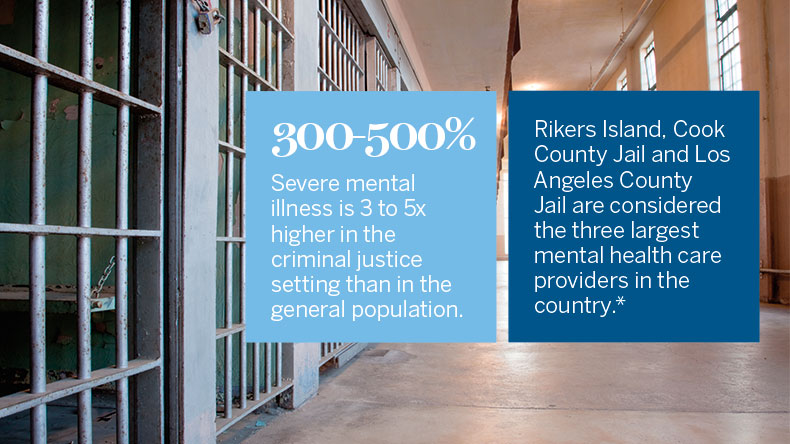
New Master of Arts in Criminal Justice and Behavioral Health Broadens Offerings at Intersection of Law and Mental Health
Persons with mental and behavioral health disorders are substantially overrepresented in the criminal justice system. Today, several sources point to the Los Angeles County Jail as the largest mental healthcare provider on the West Coast. On the East Coast, it is Rikers Island jail in New York.*
Dr. Joseph Toomey, assistant professor of Psychology in the Clinical Psychology Doctoral Program and director of the Forensic Psychology Concentration, notes that the rate of severe mental illness is three to five times higher in the criminal justice setting than in the general population. In county correctional facilities, he adds, suicide is the leading cause of death.
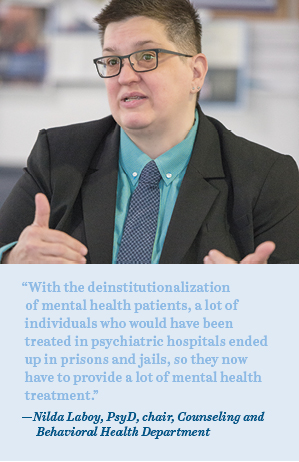 “The criminal justice system has become the default system for individuals who have
difficulty accessing effective evidence-based mental and behavioral healthcare in
communities. The need to train people familiar with these healthcare needs is overwhelming
in the criminal justice setting,” says Dr. Robert Kinscherff, associate vice president for Community Engagement and associate professor in the
Clinical Psychology Doctoral Program.
“The criminal justice system has become the default system for individuals who have
difficulty accessing effective evidence-based mental and behavioral healthcare in
communities. The need to train people familiar with these healthcare needs is overwhelming
in the criminal justice setting,” says Dr. Robert Kinscherff, associate vice president for Community Engagement and associate professor in the
Clinical Psychology Doctoral Program.
Dr. Nilda Laboy, chair of the Counseling and Behavioral Health Department and associate professor, explains that this need is significant at every point in the criminal justice system. That “with deinstitutionalization of mental health patients, a lot of individuals who would have been treated in psychiatric hospitals ended up in prisons and jails, so they now have to provide a lot of mental health treatment. “There also is an overrepresentation among the incarceration of minorities and people of lower socioeconomic status. Some of them were caught dealing drugs or intoxicated in public, but because of their lack of resources, they can’t hire a good attorney and enter a diversion program, so they end up in jail,” says Laboy.
As for community reintegration, “people are often sent back into the community without a real plan. They leave jail with no money, no place to stay, and no current job skills. It’s likely that they will commit another crime and return to jail,” says Laboy.
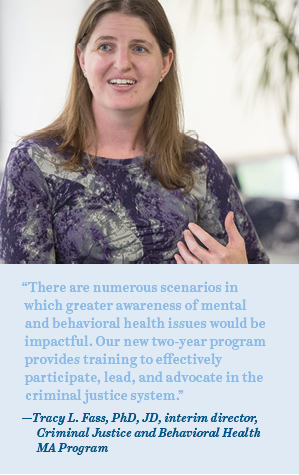 Master of Arts in Criminal Justice and Behavioral Health
Master of Arts in Criminal Justice and Behavioral Health
To provide more training in this area, William James College is launching a new Master of Arts (MA) in Criminal Justice and Behavioral Health. Kinscherff explains, “This program is unique because it focuses on providing criminal justice professionals with the skills and information to deal with the reality of the significant mental and behavioral health needs in the criminal justice system. Other schools may offer a class on mental or behavioral health, but this program equips students to address the mental and behavioral health issues in criminal justice populations.”
Dr. Tracy Fass, interim director of the new MA program and associate professor in the Clinical Psychology Department, says, “We put people with mental illness and addiction issues into correctional facilities where they fear for their lives and don’t necessarily get the treatment they need, then we are surprised when they are released and commit more crimes. That system doesn’t rehabilitate them. This program is trying to inform criminal justice personnel about empirically validated treatments.”
Fass, who previously worked at the LA County Jail, explains that there are numerous scenarios in which greater awareness of mental and behavioral health issues would be impactful. “Corrections officers sometimes think inmates with mental health issues are faking it, so they don’t get treatment. In many cases, a severely mentally ill homeless person pushing a grocery cart starts yelling and scares someone. If the police arrive first, the person goes to jail for ‘possession of a shopping cart’ (a form of theft). If an ambulance arrives first, they may go to a hospital if there is a bed available. Similarly, people with drug problems need to be treated for addiction because if you don’t treat the problem, it is a revolving door in the criminal justice system.”
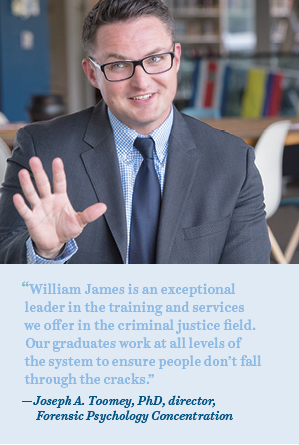 The new two-year program provides training in the content and skills required to effectively
participate, lead, and advocate in the criminal justice system. It is designed for
professionals already working or seeking to work in law enforcement, corrections,
court systems, or public policy and advising. Through this program, students will
learn how to recognize the signs of mental illness, interact with individuals with
mental illness, and collaborate with mental health professionals.
The new two-year program provides training in the content and skills required to effectively
participate, lead, and advocate in the criminal justice system. It is designed for
professionals already working or seeking to work in law enforcement, corrections,
court systems, or public policy and advising. Through this program, students will
learn how to recognize the signs of mental illness, interact with individuals with
mental illness, and collaborate with mental health professionals.
In addition to this MA degree, William James College offers several other options for students interested in careers at the intersection of law and mental health:
Clinical Psychology PsyD with a Concentration in Forensic Psychology
This doctoral program provides comprehensive forensic psychology training by providing specialized coursework and applied experience in assessing, conceptualizing, and treating the mental health needs of correctional populations.
Master of Arts in Clinical Mental Health Counseling with an Emphasis in Forensic and Correctional Counseling
This program prepares clinicians to provide interventions and services to individuals in a wide range of correctional and forensic settings.
Department of Community Engagement
William James College collaborates with Massachusetts Department of Mental Health clinicians to provide joint staffing at the Boston Juvenile Court Clinic and a multidisciplinary training program in juvenile forensic mental health.
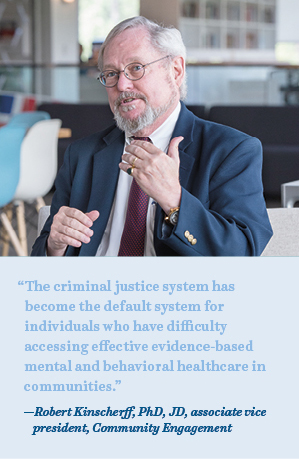 Center of Excellence for Children, Families and the Law
Center of Excellence for Children, Families and the Law
This center offers a range of education, evaluation, research, and professional consultation services, including a certificate in Child and Family Forensics. It supports informed professional practices, effective prevention and intervention, and thoughtful jurisprudence.
“William James is an exceptional leader in the training and services we offer in the criminal justice field,” says Toomey. “Our graduates work at all levels of the system to ensure people don’t fall through the cracks and that staff are as informed as possible about mental and behavioral health issues to prevent bad outcomes.”
Kinscherff adds, “These programs are consistent with the social justice mission of the College because many persons currently under criminal justice supervision or incarcerated do not need to be there as a matter of public safety if they can access evidence-based care in their communities. Effectively addressing behavioral health needs reduces recidivism risk, which reduces the risk of crimes and violence in our communities more than the current policy of mass incarceration.”
- Tags:
- Around Campus
Topics/Tags
Follow William James College
Media Contact
- Katie O'Hare
- Senior Director of Marketing
- katie_ohare@williamjames.edu
- 617-564-9389
